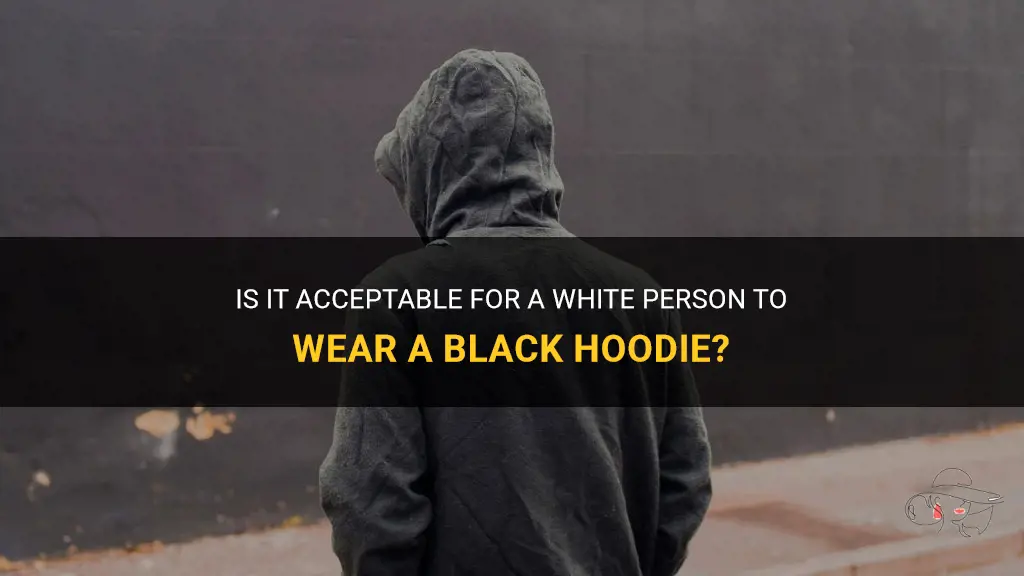
In a world where fashion serves as both a means of self-expression and a social statement, one question remains controversial: can a white person wear a black hoodie? The classic black hoodie, often associated with counterculture movements and urban fashion, has transcended race and become a staple in many people's wardrobes. However, the debate over cultural appropriation and the significance of clothing choices leaves some questioning if it is appropriate for a white individual to don this iconic garment. Join us as we delve into this nuanced discussion and unravel the complexities behind the black hoodie's universal allure.
What You'll Learn
- Is there a specific cultural or historical significance associated with black hoodies that makes them inappropriate for white people to wear?
- Are there any guidelines or social norms that dictate what type of clothing people of different races or ethnicities should wear?
- Does the context or setting in which the black hoodie is being worn play a role in determining whether it is culturally appropriate for a white person to wear?
- Are there any potential negative consequences or misunderstandings that could arise from a white person wearing a black hoodie?
- How do different perspectives and cultural backgrounds shape individuals' views on whether a white person can wear a black hoodie?

Is there a specific cultural or historical significance associated with black hoodies that makes them inappropriate for white people to wear?

Black hoodies have become a popular fashion choice in recent years, but their association with certain cultural and historical significance has led to debates about whether it is appropriate for white people to wear them. In order to understand this issue, it is important to examine the origins and meanings behind black hoodies.
One significant cultural association with black hoodies is their connection to the hip-hop and urban fashion scene. Black hoodies have been a staple in the wardrobes of many hip-hop artists and fans, who use them as a way to express their style and identity. This association has led to black hoodies being seen as symbols of urban culture and music.
In addition to their cultural connections, black hoodies also have a historical significance that should be taken into consideration. For many marginalized communities, such as Black Americans, black hoodies have been used as a form of protest and resistance. The hoodie has become a powerful symbol after the tragic killing of Trayvon Martin in 2012, when he was wearing a black hoodie. This event sparked a national conversation about racial profiling and the dangers that Black individuals face simply because of their appearance.
Given this cultural and historical context, it is understandable why some people argue that white individuals wearing black hoodies can be seen as appropriative. By wearing a black hoodie, individuals may unknowingly or intentionally be participating in the cultural practices and symbols of a community that has experienced oppression and discrimination.
However, it is important to note that fashion trends and cultural associations are dynamic and evolve over time. Black hoodies are no longer exclusively linked to hip-hop culture or activism. Many individuals, regardless of their race, now wear black hoodies simply because they find them comfortable or stylish. It is crucial to consider the intentions and motivations behind an individual's choice to wear a black hoodie, rather than making sweeping judgments based solely on their race.
Furthermore, it is essential to recognize that clothing choices are just one aspect of cultural appropriation. Appropriation occurs when someone from a dominant culture adopts or uses elements of a marginalized culture without understanding or respecting its significance. Wearing a black hoodie alone does not automatically constitute appropriation, but it is important for individuals to educate themselves about the cultural context and history associated with the items they choose to wear.
In conclusion, the appropriateness of white people wearing black hoodies is a nuanced and complex issue. While black hoodies have cultural and historical significance, the appropriateness of wearing them should be determined by the individual's intentions, understanding of the context, and respect for the communities who have a real attachment to these symbols. It is essential to be mindful of the cultural and historical implications of our fashion choices and to engage in open conversations to better understand the complexities of cultural appropriation.
Bear Fashion: The Rise of the Hoodie-Wearing Bear
You may want to see also

Are there any guidelines or social norms that dictate what type of clothing people of different races or ethnicities should wear?

Clothing is a form of self-expression that can reflect one's personal style, culture, and individuality. While there may be certain cultural or traditional clothing associated with specific races or ethnicities, it is important to note that there are no universal guidelines or social norms that dictate what type of clothing people of different races or ethnicities should wear. Clothing choices are influenced by a variety of factors, including personal preference, cultural background, social influences, and individual fashion trends.
Cultural clothing, also known as ethnic or traditional clothing, holds significant meaning for various communities around the world. It represents a sense of identity, heritage, and can serve as a way to connect with one's roots and ancestors. For example, traditional Japanese clothing such as kimono is worn during special occasions and cultural festivals.
However, it is important to recognize that individuals within these communities may choose to dress in a way that deviates from traditional clothing. The concept of fashion and style is subjective and can vary greatly among individuals, regardless of their racial or ethnic background. People may choose to adapt their clothing choices to suit their personal tastes, lifestyle, or current fashion trends.
In today's diverse societies, cultural mixing and cultural appreciation have become more prevalent. This has led to the popularization and integration of elements from different cultures into mainstream fashion. For instance, it is not uncommon to see individuals from different ethnic backgrounds wearing clothing inspired by other cultures, such as African prints, South Asian sarees, or Native American-inspired accessories.
It is essential to approach the topic of clothing and race with sensitivity and respect. While it can be interesting and educational to appreciate and learn about different cultures through clothing, it is crucial to avoid appropriating or disrespecting the cultural significance behind certain garments. Appropriation occurs when elements of a minority culture are borrowed without proper understanding, appreciation, or permission, often leading to the erasure of its true meaning and significance.
It is always advisable to approach cultural clothing with an open mind and a desire to learn and appreciate, rather than appropriate. If you are interested in incorporating elements from different cultures into your wardrobe, it is essential to do proper research, engage in meaningful conversations, and support artisans or designers from those cultures. This helps ensure that the clothing you wear is a form of respectful appreciation rather than cultural appropriation.
In conclusion, while there may be cultural or traditional clothing associated with specific races or ethnicities, there are no universal guidelines or social norms that dictate what type of clothing people of different races or ethnicities should wear. Clothing choices are influenced by personal preference, cultural background, social influences, and individual fashion trends. It is essential to approach cultural clothing with respect, avoiding cultural appropriation and seeking to appreciate and learn about different cultures in a meaningful and respectful manner.
The Power of a Busy Signal Wearing Hoodie: A Modern Day Symbol of Productivity
You may want to see also

Does the context or setting in which the black hoodie is being worn play a role in determining whether it is culturally appropriate for a white person to wear?

Fashion has always been a way for individuals to express themselves and showcase their personal style. However, in recent years, the question of cultural appropriation has come to the forefront of discussions surrounding fashion choices. Cultural appropriation refers to the adoption or borrowing of elements from another culture, particularly by members of a dominant culture. This discussion has raised questions about whether it is culturally appropriate for a white person to wear certain items of clothing, such as black hoodies, in certain contexts.
When discussing cultural appropriation in fashion, it is essential to consider the power dynamics and historical context involved. Black hoodies, for example, have significant cultural associations with the black community, specifically with African American and hip-hop culture. This is due to their prominence in these communities and their symbolic link to resistance against racial injustice. In this historical context, wearing a black hoodie can carry a deep and significant meaning.
The context in which the black hoodie is being worn plays a crucial role in determining whether it is culturally appropriate for a white person to wear it. For instance, if a white person were to wear a black hoodie as a fashion statement without any knowledge or respect for its cultural significance, it could be seen as an act of cultural appropriation. This would be especially true if the person were to wear it in a context that trivializes or disrespects the struggles of the black community.
However, there are instances where wearing a black hoodie as a white person can be culturally appropriate. Suppose the person is actively engaging with and showing support for the black community, such as attending a protest against racial injustice or supporting black-owned businesses. In these contexts, wearing a black hoodie can be seen as a form of solidarity rather than appropriation. It is essential for individuals to educate themselves about the significance of certain clothing items and understand their historical and cultural context before wearing them.
Furthermore, it is important to highlight that the concept of cultural appropriation is not always black and white. There is a fine line between appreciation and appropriation, and it can sometimes be subjective. It is crucial to listen to the voices and perspectives of members of the culture being appropriated and be willing to learn and adapt one's choices accordingly.
To illustrate this point, consider the example of a white person attending a music festival where black hoodies are commonly worn. In this setting, the black hoodie may be seen as a fashion choice rather than a statement of cultural appropriation. However, if the person were to wear the black hoodie and engage in culturally insensitive behavior, such as mocking or appropriating African American vernacular or gestures, it would cross the line into cultural appropriation.
In conclusion, the context and setting in which the black hoodie is being worn do play a significant role in determining whether it is culturally appropriate for a white person to wear. It is crucial for individuals to be mindful of the historical and cultural significance of fashion choices and to engage in respectful and educated behavior when wearing items associated with a different culture. Ultimately, the goal should be to promote understanding, respect, and inclusivity in the world of fashion.
Exploring Ariana Grande's Favorite Hoodies and Streetwear Style
You may want to see also

Are there any potential negative consequences or misunderstandings that could arise from a white person wearing a black hoodie?

Wearing a black hoodie is a fashion trend popular among people of all races and ethnicities. However, it is important to recognize that fashion choices can sometimes be misinterpreted or cause misunderstandings, depending on the context and societal norms. In the case of a white person wearing a black hoodie, there are certain potential negative consequences or misunderstandings that could arise.
One potential consequence is the association with criminal activity. Due to the prominence of black hoodies in the media when used to conceal one's identity during criminal acts, some people may form a negative perception or stereotype when they see a white person wearing a black hoodie. This can lead to unjustified suspicion or fear, creating a hostile environment for the individual.
Another possible consequence is cultural appropriation. The black hoodie has deep-rooted associations with certain subcultures and communities, such as streetwear, hip hop, and alternative music scenes. When a white person wears a black hoodie, especially if it is adorned with symbols, logos, or slogans associated with these communities, it can be seen as appropriating their culture without understanding or respecting its significance. This can be offensive and disrespectful to those who hold these cultural symbols dear.
Furthermore, the color black itself can carry certain connotations. In some cultures, black is associated with mourning or sadness and wearing black clothing is reserved for specific occasions or ceremonies. If a white person wears a black hoodie without considering these cultural sensitivities, it may be perceived as disregarding or trivializing the importance of these customs.
To avoid these negative consequences and misunderstandings, it is crucial for individuals to be aware of the potential implications of their fashion choices. First and foremost, it is important to respect the boundaries of other cultures and communities and avoid appropriating their symbols or attire without understanding their significance. Additionally, considering the context in which the hoodie is worn and being mindful of the potential stereotypes associated with it can help mitigate any negative assumptions or misunderstandings.
Ultimately, fashion choices are a personal expression of individuality, and everyone should feel free to wear what makes them comfortable and confident. However, it is essential to be aware of the potential impact that these choices may have on others and to be respectful and sensitive to different cultural perspectives. By doing so, we can create a more inclusive and understanding society where fashion can be enjoyed without causing harm or perpetuating stereotypes.
The Empowering Statement of a Black Woman: Embracing Identity in a Plain Black Hoodie
You may want to see also

How do different perspectives and cultural backgrounds shape individuals' views on whether a white person can wear a black hoodie?

Clothing is an essential aspect of human culture, with various styles and fashion trends that reflect individual preferences and group affiliations. Certain clothing choices, such as wearing a black hoodie, can sometimes be subject to debate and different interpretations based on an individual's perspective and cultural background.
From a scientific standpoint, studying the impact of clothing on social perception and cultural norms can provide valuable insights into how different perspectives shape individuals' views on whether a white person can wear a black hoodie. Psychological research has shown that clothing choices can convey information about a person's social identity, attitudes, and values. For example, wearing a black hoodie might be associated with urban fashion, youth culture, or even a certain subculture. These associations can vary across different regions and communities, further highlighting the significance of cultural backgrounds in shaping individual perceptions.
One's cultural background plays a crucial role in shaping their views on whether a white person can wear a black hoodie. Cultural norms establish expectations about appropriate attire, and these norms are shaped by historical, social, and racial factors. In some cultures, black hoodies may be associated with criminal activity, particularly in communities where there is a history of racial profiling or stereotyping. This perspective may lead individuals from those communities to be hesitant or caution against a white person wearing a black hoodie.
Conversely, in other cultural contexts, such as the fashion industry or streetwear culture, wearing a black hoodie can be seen as a neutral or even trendy choice, regardless of the individual's race. This perspective suggests that personal style and individual expression should not be restricted based on race. The fashion world often emphasizes inclusivity and breaking down traditional boundaries, encouraging people to wear whatever they feel comfortable and stylish in.
Real experiences of individuals from different backgrounds further emphasize the diversity of perspectives on this matter. Some people may have had negative encounters or experiences where wearing a black hoodie, particularly as a white person, elicited suspicion or even hostility. These experiences can shape their belief that certain clothing items should be reserved for specific racial or cultural groups. On the other hand, individuals who have not encountered any negative experiences or who have grown up in communities where clothing choices are less racially charged may have a more open-minded view and see no issue with a white person wearing a black hoodie.
It is vital to understand that perspectives and views on this topic can be complex and subjective. People's beliefs and opinions are influenced by their unique experiences, upbringing, exposure to different cultures, and media influences. It is crucial to engage in open and respectful conversations to build bridges between differing perspectives, fostering understanding and appreciation for each other's viewpoints.
In conclusion, the question of whether a white person can wear a black hoodie is not a straightforward matter. Different perspectives and cultural backgrounds shape individuals' views on this topic, highlighting the significance of personal experiences, cultural norms, and the diverse nature of society. By recognizing these differences and engaging in open dialogue, we can promote empathy, understanding, and respect for each other's perspectives.
Brendon Urie Rocks the Hoodie Look with Style and Confidence
You may want to see also
Frequently asked questions
Yes, a white person can wear a black hoodie without necessarily facing criticism or backlash. Hoodies are a popular and versatile clothing item that transcends racial boundaries. Many people, regardless of their race, wear hoodies as a comfortable and casual choice.
No, there are no specific cultural or historical reasons why a white person should not wear a black hoodie. The color of the hoodie does not have inherent cultural or historical significance that would restrict its use by any specific racial group.
Yes, it is appropriate for a white person to wear a black hoodie in various contexts such as casual gatherings, outdoor activities, or sports events. As long as the hoodie is worn in an appropriate setting and is not being used to perpetuate offensive stereotypes or promote discrimination, there is no reason why a white person cannot wear a black hoodie.
There are potential misconceptions or stereotypes associated with anyone wearing a black hoodie, regardless of their race. Due to its popularity among certain subcultures, black hoodies have been unfairly associated with criminal behavior or the concealment of one's identity. However, it is important to recognize that these stereotypes are baseless and should not be applied to individuals simply based on their choice of clothing.
To ensure they are not appropriating or offending others, a white person can be mindful of the context in which they wear a black hoodie and respect any possible cultural or historical significance that might be associated with it. It is important to approach fashion choices with sensitivity and consider the potential impact it may have on others. Additionally, engaging in open-minded conversations and learning about different cultural perspectives can help in understanding and avoiding any unintentional offense.







